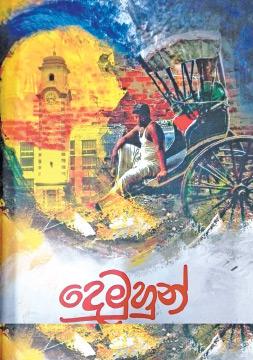
‘Demuhun’ Author:
Jayantha Mangala Rajapaksa
Sarasavi Publishers, Nugegoda
252 pages
Price: Rs 425
Jayantha Mangala Rajapaksa’s latest Sinhala novel is ‘Demuhun’ (Mixed). It is the story of Velu, a rickshaw-man, his wife Soma and their children. Velu comes to Sri Lanka with a group of Indian labourers during the British period. At the time most Sri Lankans did not want to work on the tea estates. They were also reluctant to do menial work such as toilet cleaning. Velu first works as a rickshaw-man and then starts driving a taxi. He falls in love with Soma, a housemaid. The novelist narrates Velu’s rise and fall in a society which is partly ruled by the underworld and each man’s fate. The novelist opens a window to the world of downtrodden people in the city when the British were ruling the country. He shows us how the poor are exploited by the rich and underworld figures who show no mercy to anyone whether they are Sri Lankans or Indians. It is not easy to lead a decent life however much they try. While the poor people suffer, the rich throw parties spending lavishly on food and liquor. The situation has not changed much even today in many parts of the world.
The novelist takes the reader on a conducted tour into the urban ghettoes where people live separately from the main population, usually in a deplorable condition. The reader can learn how they live, eat, drink and ultimately perish, wallowing in misery and misfortune. The author joins a host of other foreign and local novelists who have peeped into the dark world of the downtrodden.
The novel gives a vivid description of human trafficking in the 1940s. Men, women and children from neighbouring India were brought into the country and some of them settled down in tea estates. Others found accommodation in the city’s overcrowded slums. Those who live in their own houses with all the basic facilities do not understand the agony undergone by such people. Apart from their poverty they easily become victims of anti-social activities. To get rid of their poverty, most of them engage in selling illicit liquor and women take to the world’s oldest profession.
Some of the parents living in the slums try to educate their children by sending them to schools. Velu too sends his children to school but none of them do well in education. Young Velu was also sent to school by his parents but he does not succeed. Finally, like many other slum children, he decides to bid goodbye to school. Thereafter they try to earn money by doing all kinds of odd jobs, and easily become the pawns of scheming people who exploit them.
The author shows that even those living below the poverty line have dreams. They fall in love, get married and raise children. They try to do business and to educate their children. However, they have to surmount many social barriers. Only a handful of them manage to come out of the vicious circle. Velu follows the same procedure. He gives up his rickshaw and tries his hand at running a hotel with his wife. But they fail to succeed in life for no fault of theirs. They are just victims of the circumstances.
The author has succeeded in depicting the life of the downtrodden people who lived in a bygone era. The novel is a grim reminder that there are people in the so-called civilized world who have no feelings or respect for those who suffer in silence.
